President Andrés Manuel López Obrador (AMLO) affirmed that the U.S. government wants to avoid, as Mexico does, a dispute settlement panel for certain energy policies carried out by Mexico.
«When it was thought that there were going to be conflicts over the consultation on energy matters, we informed, we clarified, we made our point of view known and they have decided not to take the step towards a panel and an agreement is being sought, that there be no confrontation,» he stated in a morning conference.
«There is no reason for me to refer to those who bet on confrontation, there are always experts, internationalists who rub their hands together looking for confrontation, I hope they calm down, like those here, the opponents, conservatives, who we respect them a lot, that they count to 10, take a deep breath before launching themselves again», said López Obrador this Friday in a conference at the National Palace.
AMLO
Earlier in 2022, a U.S. congressional analysis indicated that López Obrador’s energy policies «have worried» energy investors and U.S. companies with much of their supply chains in Mexico.
The AMLO administration’s decisions to halt new auctions in the oil and gas sector, as well as wind and solar energy projects, surprised investors and «put hundreds of existing projects in limbo.»
On July 20, 2022, the United States requested consultations with Mexico under the Dispute Settlement chapter of the USMCA, arguing that several of Mexico’s energy policies are inconsistent with the USMCA.
The measures challenged by the United States affect a wide range of energy resources and technologies, including natural gas, electricity, renewable sources such as wind and solar, and diesel fuel. The United States alleges that the measures at issue favor Mexican state-owned companies to the detriment of U.S. companies and U.S.-produced energy, thereby violating Mexico’s commitments under the USMCA chapters on market access, investment and state-owned enterprises, as well as undermining climate objectives.
Measures Imposed
The Government of Canada has stated that it agrees with the U.S. position and has submitted a parallel request for consultations, the text of which is not yet public.
Mexico’s actions include, but are not limited to, amendments to Mexico’s electricity law that would prioritize the distribution of CFE-generated power over cleaner energy sources provided by private sector suppliers, such as wind and solar.
They also include Mexico’s delays, denials and revocations of U.S. companies’ ability to operate in Mexico’s energy sector, including with respect to renewable energy projects.
According to USTR, these policy changes impact U.S. economic interests in multiple sectors and discourage investment by clean energy suppliers and companies seeking to purchase clean, reliable energy.
Also, USTR argued that Mexico’s policies have largely cut off U.S. and other countries’ investment in the country’s clean energy infrastructure, including significant steps to reverse reforms Mexico previously made to meet its climate goals under the Paris Agreement.
![]()

